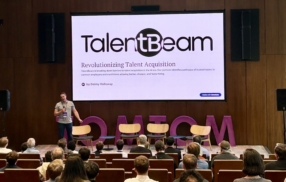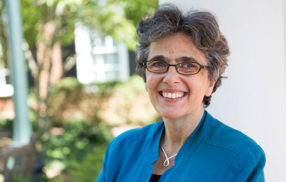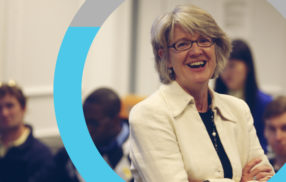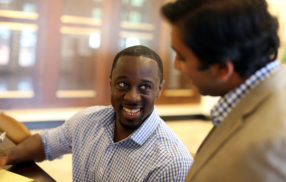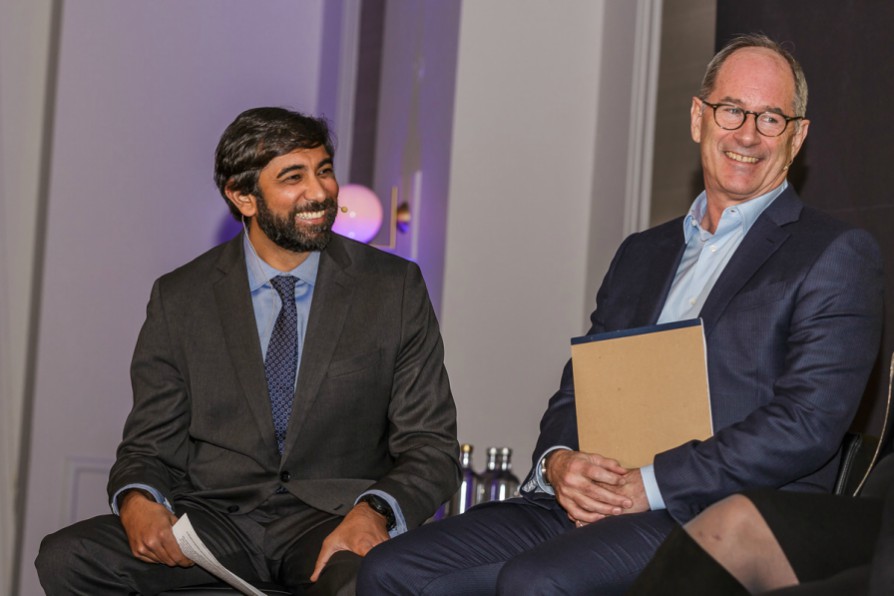
UVA Darden Professors Recognized at Thinkers50 Distinguished Achievement Awards
By Julie Daum
Thinkers50, a biennial ranking of global business thinkers, recognized two University of Virginia Darden School of Business Professors as finalists for Distinguished Achievement Awards at a ceremony on 13 November in London. Thinkers50 celebrates the thinkers behind powerful business and management ideas.
Jeanne Liedtka, Darden’s United Technologies Corporation Professor of Business Administration, and Mary Gentile, Darden Professor of Practice, were recognized on shortlists of the world’s most influential thinkers. Bobby Parmar, Darden associate professor in the area of ethics, chaired a panel of thought leaders on the topic, Ethics in a Post-Truth World.
Democratizing Innovation
Liedtka was a finalist for the Innovation Award, which recognizes the thinker who has contributed the most to the understanding of innovation over the last two years.
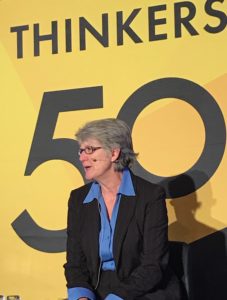
Professor Jeanne Liedtka at the Thinkers50 event in London.
Liedtka is the author of the recently published book Designing for the Greater Good: Innovation in the Social Sector. She has also co-authored other books, including Designing for Growth: A Design Toolkit for Managers and Solving Problems With Design Thinking: Ten Stories of What Works.
A teacher of corporate strategy and a pioneer in the area of design thinking, Liedtka gave a quickfire, eight-minute talk on the subject at the daylong Thinkers50 event, which examined the key management issues of today.
Design thinking is a problem-solving toolkit used to generate ideas and conversations across differences that lead to practical solutions. “It’s teachable and scalable and enables us to democratize innovation,” said Liedtka.
Giving Voice to Values
Gentile was a finalist for the Thinkers50 Ideas Into Practice Award, which celebrates organizations that put new ideas to work. Gentile is the creator and director of Giving Voice to Values, a business curriculum for values-driven leadership that has been embraced worldwide and piloted at over 900 business schools and organizations. A senior adviser at the Aspen Institute Business & Society Program, Gentile authored the book Giving Voice to Values: How to Speak Your Mind When You Know What’s Right.
Information Rich, Wisdom Poor
A key theme across the Thinkers50 presentations was an examination of trust, threatened by the new world of technology in which rapid-fire tweets, posts and blogs compete with accurate information and enlightened ideas for mindshare — and put privacy at risk.
Parmar explored the theme of “ethics in a post-truth world” as chair of a panel featuring Roger Martin, dean emeritus of the Rotman School of Management in Toronto, who was named the No. 1 thinker in the Thinkers50 2017 ranking; Herminia Ibarra, professor of organizational behavior at London Business School; and Hal Gregersen, executive director of the MIT Leadership Center.
Parmar observed that “people often consume information not for what it says, but for how it makes them feel.”
Martin cast doubt that truth even exists. “The notion that anybody actually has access to the truth is a fantasy,” he said.
Gregersen drew parallels between truth-finding and cartography. Just as cartographers historically drew their own maps embedded with a purpose, do people today use information to find their own truth? Are some truths more true than others?
Ibarra commented that trust leads to truth and opined that the “concentration of power today is part of the problem,” and that leaders are losing trust. In a world in which information travels instantaneously, “people are scared to speak truth, as they can lose their reputation in a nano-second,” she said.
Gregersen, who received the Thinkers50 2017 Distinguished Award for Leadership, asked if leaders today have enough space in their environments to ask the hard questions that lead to truth. “How many leaders are crystal clear on what they are solving for, and how far they are willing to go in pursuit of the truth?” he asked.
Martin emphasized that behind every good idea is an understanding of the human beings who are being served.
The panel emphasized that leaders today need to move beyond just data and get out into the field — to get out of the bubble — to find out what’s happening on the ground and to constantly remind themselves that decisions often have an ethical component, with consequences for real people. Great CEOs find out what’s happening on truck routes and in the factories, said Gregersen.
“We need to move from a knowing mindset to a learning mindset,” said Parmar. “It’s the double-edged sword of the digital age: You can be information rich, yet wisdom poor.”

Attendees gather for a reception at the 2017 Thinkers50 Distinguished Achievement Awards.
The University of Virginia Darden School of Business prepares responsible global leaders through unparalleled transformational learning experiences. Darden’s graduate degree programs (MBA, MSBA and Ph.D.) and Executive Education & Lifelong Learning programs offered by the Darden School Foundation set the stage for a lifetime of career advancement and impact. Darden’s top-ranked faculty, renowned for teaching excellence, inspires and shapes modern business leadership worldwide through research, thought leadership and business publishing. Darden has Grounds in Charlottesville, Virginia, and the Washington, D.C., area and a global community that includes 18,000 alumni in 90 countries. Darden was established in 1955 at the University of Virginia, a top public university founded by Thomas Jefferson in 1819 in Charlottesville, Virginia.
Press Contact
Molly Mitchell
Senior Associate Director, Editorial and Media Relations
Darden School of Business
University of Virginia
MitchellM@darden.virginia.edu


